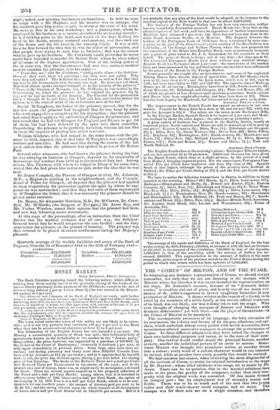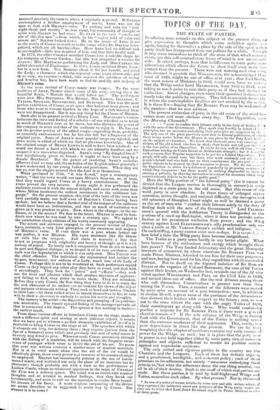THE " COMUS " OF MILTON, AND OF THE STAGE.
Ist witnessing any dramatic representation of Comas, we should always remember, not only that we are not listening to the masque which MILToN wrote, but also that it was never intended for representation on the stage. Dr. JOHNSON'S censure, because of its " dramatic defici- encies, is needless and out of place, and is only one of too many evi- dences of the critic's eagerness to invent imaginary blemishes in any production of MILTON. A drama written at the request of a friend, to be acted by the members of a noble family at the remote official residence of its head, was not likely, nor was it designed, to suit the stage. WhO ever thought of charging the masques of JONSOSI and SHIRLEY with dramatic deficiencies? yet with these—not the plays of SHAESPERE—is the Comas of MILTON to be measured.
The incomparable sweetness of its language, the lofty elevation of its sentiments, the infinity and beauty of its images. allusions, and epi- thets, which embellish almost every period with lavish decoration, have nevertheless allured successive managers to attempt the performance of COMM. In these different adaptations they have suited the changes to their own individual purposes and tastes, or to the state of their com- pany. One revival would render music the principal feature, another scenery, another the individual powers of an actor or actress. Some- times MILTON was brought into prominent notice. at another thrust into a corner ; every word of a certain character would in one instance be recited, while at another time every possible line would be omitted. We had occasion last season, when reviewing the most disgraceful of all the revivals of Counts, to notice its original introduction to the stage by Dr. Duarow ; whose chief additions were songs, set to music by Dr. ARNE. There can be no question, that in the musical additions then made to the piece, the genius of the composer, rather than their con- gruity with the original work, was consulted. Of this music formed an integral part ; but its employment was of necessity scanty and feeble. There was to be as much and of the sort that two young ladies and their music-master could compass, and no more. The masque was for their sole use on a single occasion, and therefore
assumed precisely the tbrm in which originally appeared. If DALTON contemplated a further employment of music, ARNE was not the
man to deal with Altrmoit's verse. To prolong and vary the " mid-
night shout and revelry " he was equal, but community of thought or spirit with MIL'T'ON he had none. He dwelt in the very " smoke and
stir of this dim spot "— from which, in his " region mild of calm and serene air," MILTON looked down. He cc the music of Anse is not to the words of Comus so much as to the songs which Dr. DALTON inter- polated, which are all bacchanalian. Here ARNE had no difficult task to accomplish—little was required of him, and that little he did well.
In 1772, the elder COLMAN moulded Comes into a suitable shape for his company at Covent Gardep : but this was altogether a version for singers ; Mrs. Mal-melts performing the Lady, and Miss CATLEY the added character of Euphrosyne. In 1785, Comes revisited Drury Lane ; but in a new form. Mrs. SIDDoNS chose it for her benefit, and acted the Lady ; a character which she repeated some years afterwards : and th me only, we venture to think, who enjoyed the privilege of seeing and hearing her, have been made to feel the melody and majesty of MILTON'S verse.
lo the next revival of Conies music was trump. To the com- positions of ARNE, BISHOP added some of his own ; among them the
beautiful finale, " Mortals that would follow me." The performers
were now Miss STEPHENS, Mrs. BISHOP, Mrs. LISTON. INCLEDON, C. TAYLOR, SINCLAIR, BROADHURST, and DURUSET. This was the most perfect exhibition of Comes as an opera that had ever been given ; and those who went to Covent Garden in the hope of a rich musical treat were not disappointed. But it was any thing but the Comus of MILTON. Such also is its present revival at Drury Lane. MACREADY'S version indicates the taste and feeling of a scholar—of one who desi es to retain
as much of MILTON'S text as he dares, but who distrusts the power of his company to utter and that of his audience to enjoy it. He has cast out the greater portion of the added songs,—regarding them, probably, as unseemly excrescences ; but he has also left but a fragment of the original poem. Some of Aut4E's most popular songs are rejected, and some music is added of which we had no previous knowledge. One of the original songs of HENRY LAWNS is said to have been retained : we 'could not detect a hand with which we are tolerably familiar, and we suspect it was somewhat disguised. ARNE'S song "By dimpled brook" was injudiciously given to ALLEN: it ought to have been sung by a female Bacchanal. But the power of rendering ARNE'S melodies effective (and rte may add, the melodies of the English school generally) is not understood by our young ladies and gentlemen. When they are not so, rest the singers assured that the fault is in themselves.
When produced in 1738, " it was feared," says a contemporary writer, " that the town would not taste Milton's beau'ies, or, at least,
that they would regard Comes as a heavy entertainment. But the
event proved the very reverse. Every night it was performed the audience received it with the utmost delight, and never with more than where Milton inculcates the noblest sentiments in the sublimest lan-
guage." On the present occasion, this trial of the taste of the town was very partially made, not half even of DALTON'S Conies having been
spoken : but we believe that a further trial of the temper of the audience would have been an indiscretion, and that as much of recitation was given as it was prudent to give. Now, where is the change—in the au- dience, or in the actors? We fear in the latter. MILTON is read by hun- dreds now where he was read by tens a century ago. We appeal to the numberless cheap editions of his works constantly appearing.
The actors and actresses engaged in the present revival of Comes have, certainly, a very faint perception of the sweetness and majesty of MILTON'S verse. If ever there was a poet whose lyrical ear
was perfect, it was MILTON. His verse murmurs like the breeze or rolls like the tempest. And there is scarcely a line that
is not as pregnant with originality and beauty of thought as it is with melody of sound. To bandy, such a composition from mouth to mouth in pert and flippant dialogue, is to despoil it of its very attributes: and such was the degradation to which it was subjected. Miss FACCIT was the chief offender. The individual she represented had neither the tongue, demeanour, nor address of a Lady, much less of the Lady of Comes. Perhaps this is not to be wondered at. Such performers regard Comes as they regard any other play they have to enact, and deal with it accordingly. They look for " points " and " effects "—they seek
out for lines and phrases which shall produce thunders of applause : and failing to find, they strive to make them. They are mistaken.
Before they study Comes, the first thing they have to do is to study the lite and character of its author—to understand his views of the object and purpose of dramatic writing They seek to bend and fashion MILTON to their taste—let them rather strive to mould themselves to his, or vain will he their e:.deavours to embody in action his words and thoughts. The scenery is beautiful—the disposition and grouping t f the perform- ers, admirable. The classic eye and feeling of the manager pervade all that is connected with display. The spectator has nothing to desire- tbe auditor much.
From these various efforts to introduce Comes on the stage, made in such a different spirit and aiming at such different objects, it results
that we have yet to witness a perfect dramatic exhibition of it—if it is
desirable to bring Comas on the stage at all. The speeches with which it abounds are long for delivery there ; they require (unless from the
lips of a SIDDONS) some relief; and precisely that sort of relief music is
in every way fitted to give. Whoever reads Comes attentively through with the feeling of a musician, will be struck with the frequent recur-
rence of passages which seem to invite the aid of his art. No poem that ever was written contains a similar mine of musical materials. Nor is it in vocal music alone that the aid of the art would he effectively given, since every power add resource at its command might
be employed. MILTON has occasionally pointed at the use of instru- mental music, and indicated not only the place of its insertion but its character ; though probably not with a view to the performance at Ludlow Castle, whose instrumental apparatus in the reign of CHARLES the First was a solitary spinet. His mind was so stored with musical thoughts and so attuned to musical feelings, that they break out involuntarily, and seem to call on the musician to realize these beauti- ful dreams of his fancy. A more copious outpouring of the divine art seems therefore to be suggested in every way by Comes. But whence is it to come?



























 Previous page
Previous page